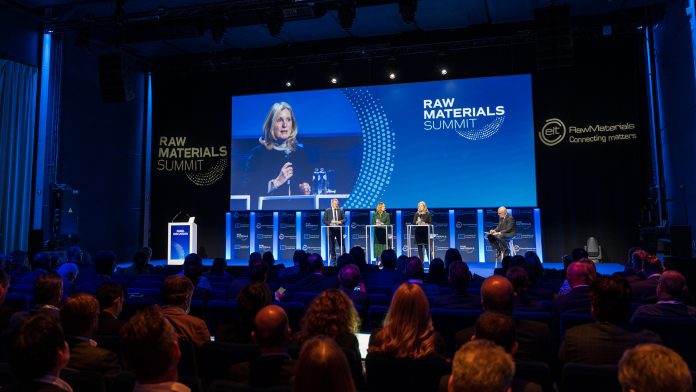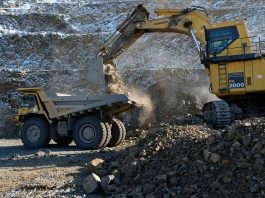Innovation News Network reflects on the fifth edition of EIT RawMaterials’ Raw Materials Summit.
On 15-17 May 2023, the fifth edition of EIT RawMaterials’ 2023 Raw Materials Summit took place at The Egg, Brussels, Belgium. The event attracted 80 speakers and 850 attendees from around the globe to discuss major innovations, policy initiatives, and challenges and opportunities facing the raw materials sector.
Consisting of three days, the Raw Materials Summit involved a series of panel discussions highlighting the innovation set to underpin the EU’s Green Deal goal. The Summit emphasised the potential of the EU’s raw materials industry and built upon the EU’s mission to develop a secure supply of raw materials.
The event also featured an Innovation Village which showcased a variety of breakthrough technologies from different entrepreneurs and start-ups.
In this article, Innovation News Network explores the four key takeaways from the Raw Materials Summit that can explain what must be done to ensure the region’s smooth transformation to carbon neutrality.
1. More work is needed on the Critical Raw Materials Act proposal
The Critical Raw Materials Act is important for Europe as it will provide access to tools to help secure a sustainable supply of raw materials.
At the Summit, it was described by industry leaders, including Kerstin Jorna, Director-General for Internal Market, Industry, Entrepreneurship, and SMEs, as a revolution compared to other single market Acts due to its focus on the business case for raw materials.
However, many leaders posed the idea that there is room for improvement in the proposal – with a poll at the event revealing that 54% of attendees who participated in the survey were unsure about the Act.
What was thought to be missing from the proposal is a lack of coherence and a particular emphasis on the Act’s strategic importance.
Ensuring that the actions within the proposal are operational was also considered to be crucial. It was argued that the Act must guarantee that major stakeholders are included.
2. There are still concerns about the skills gap and social acceptance
Two of the key barriers to the acceleration of the raw materials industry are the looming skills gap and lack of social acceptance towards mining. These issues were frequently discussed by key leaders at the Summit.
It is estimated that 1.2 million jobs are required to be filled in the industry’s future. In the panel discussion on ‘Skills for the Critical Raw Materials and Net Zero Industry Agendas’, Antonius Schröder, Social Scientist at TU Dortmund, explained that it is important to realise that the skills gap can only be closed as part of a collaborative effort.
The skills demand is driven by industry. Therefore, industry must work with educational institutions to ensure that the right skills are being taught and that students are better equipped when they enter the workforce.
Social acceptance of mining by the local communities is also a crucial barrier that must be overcome to ensure the EU’s successful transition to clean energy.
It was discussed that companies should ensure that they strengthen the social license to operate in local areas. To do this, it is important that there is a dialogue with the local residents – ensuring transparency.
3. The EU must take advantage of battery recycling
As the demand for batteries used in electric vehicles increases, the demand for effective ways to manage disused battery technology is also rising. Currently, only 20% of electric vehicle waste and less than 1% of magnets produced are recycled.
At the Summit, Umicore’s Frank Daufenbach explained that a process needs to be put into place for battery recycling to meet recovery rate targets.
There are four supporting elements that need to be implemented to accelerate the EU’s battery recycling capabilities.
- A single market for waste shipment would help keep the supply chain momentum;
- Regulation must ensure that precious metals are not wasted as a product contains a complex mixture of many elements that have the potential to be recycled;
- There must be concrete applications of eco-design promotion; and
- The right incentive market must be created otherwise industrial companies will struggle.
4. There is an underlying desire for Europe to bring the raw materials market home
The EU is dependent on China for raw materials which increases the risk of supply chain disruption.
At the event, it was emphasised by many leaders, including Maroš Šefčovič, Vice-President of the European Commission, that the EU cannot fall into the trap of overdependence on rival countries for raw materials. This is because it puts the digital and clean energy transformations into jeopardy.
The Critical Raw Materials Act aims to boost EU domestic mining and refining capacities. The Act includes clear benchmarks for domestic extraction and processing of raw materials by 2030:
- At least 10% of the EU’s annual consumption for extraction; and
- At least 40% of the EU’s annual consumption for processing.
In addition to boosting domestic supplies, working with like-minded countries is also important if supply chains are to be diversified.
Some of these global partnerships were highlighted at the conference, as we heard from leaders from many countries and regions including Jocelyn Douhéret, Director of Mining Policies at the Ministry of Natural Resources and Forest at the Government of Québec.
By identifying joint strategic opportunities, Europe can secure its supply of critical raw materials.
The fifth Raw Materials Summit highlighted that the EU is well on the path to securing a sustainable raw materials supply chain for the future but there is still work to be done to ensure that this is successfully completed.
Please note, this article will also appear in the fourteenth edition of our quarterly publication.










